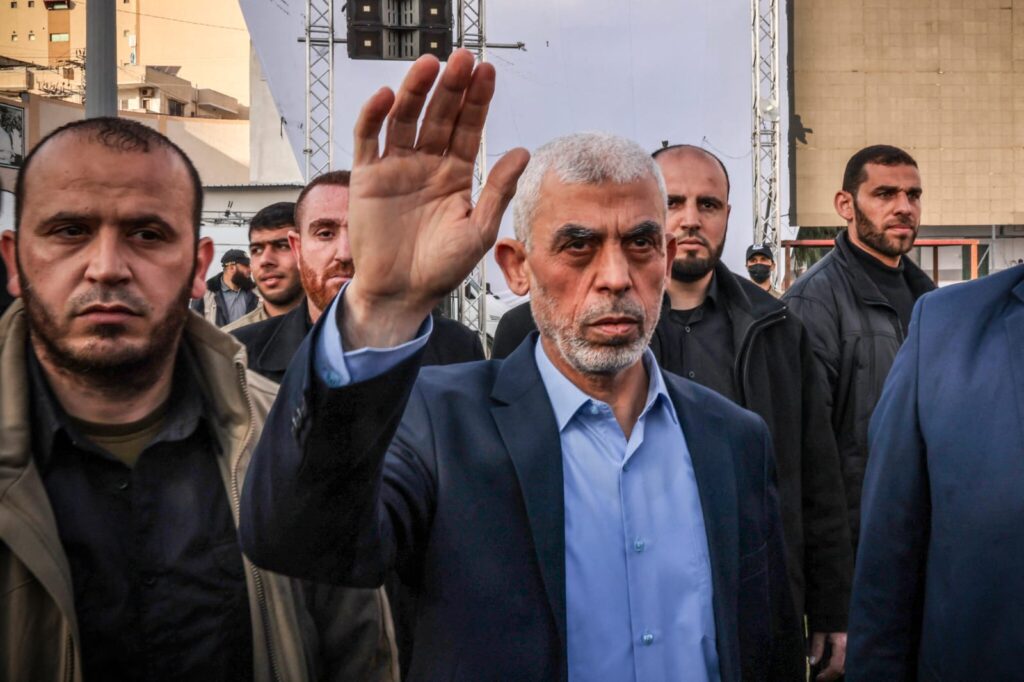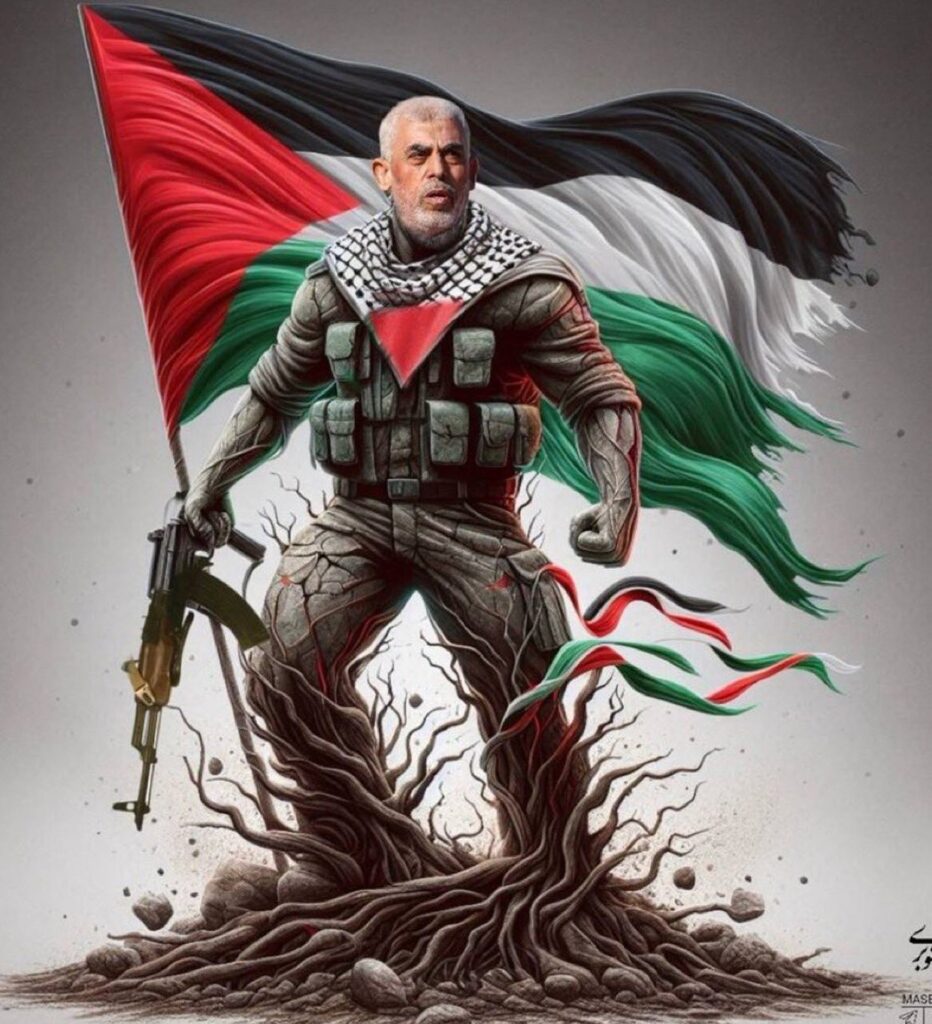
The leader Who Led From the Frontlines: Yahya Al-Sinwar
Muhammad Zubair Khaliq
“Who is this old man among the dead fighters?” “A gun, some rupees, and a few other small things are in his possession.” Israeli mercenaries must have been shocked to realize that the old man who had just been martyred while fighting on the frontlines was none other than Yahya Al-Sinwar, the head of the Islamic resistance movement in Palestine. They could hardly believe their eyes when the martyred man resembled the pictures of Al-Sinwar. But this is the reality of great leaders: they choose to be on the frontlines, among their own soldiers. Sinwar’s courage to lead from the frontlines has shocked the western world or for that matter the non-muslim world where leaders of such rank usually do not engage with their enemies on the battlefields. Muslim leaders on the other hand have always set examples of actively confronting the enemies. Sinwar’s death, while defending the cause he devoted his life to, is emblematic of a life lived in resistance — a life dedicated to his people, to freedom, and to the fight against occupation.
What made Yahya Sinwar’s leadership so unique was his commitment to face danger head-on. Rarely do we witness a leader of such stature directly engaging in the brutal reality of war and risking his life as his comrades did. His willingness to embrace the same risks as his fighters gives us an idea of the essence of Palestinian resistance: a struggle not only for survival but for dignity, justice, and the right to exist as a free people.
Born in the Khan Younis refugee camp in Gaza in 1962, Sinwar’s life story is one intertwined with the hardships, aspirations, and perseverance of the Palestinian people. Like many of his generation, Sinwar grew up under occupation, where life was defined by checkpoints, curfews, and constant surveillance. His early years were marked by the brutal realities of dispossession and displacement that eventually shaped his fierce determination to fight for Palestinian freedom.
Sinwar’s journey of resistance began in his youth, but it was during his long years in Israeli prisons — 23 years, four of them in solitary confinement — that his legacy as a leader of the Islamic Resistance Movement (Hamas) truly took shape. During his imprisonment, Sinwar did not waste a single moment. Instead, he dedicated himself in learning everything he could about the enemy, even mastering Hebrew, and formulating long-term plans for the liberation of his people. His years in solitary confinement honed his discipline, patience, and vision and enabled him to become one of the most effective and strategic minds in the resistance movement.
One of the key turning points in Sinwar’s life came in 2011, when he was released in a prisoner exchange deal known as the “Loyalty of the Free,” which saw the liberation of over 1,000 Palestinian prisoners in exchange for an Israeli soldier. It was a moment of triumph for Sinwar and the Palestinian cause. His release brought him back to Gaza, where he quickly ascended to become one of the most influential leaders of Hamas, eventually taking on the role of its political and military chief in the Strip.
Sinwar’s leadership of Hamas was characterized by a combination of ruthless pragmatism and deep ideological conviction. He was a man of few words, but his actions spoke volumes. His strategic thinking was most prominently displayed during the “Al-Aqsa Flood” operation, which involved one of the greatest military-intelligence deceptions in Israel’s history. As the mastermind behind this audacious attack, Sinwar demonstrated his ability to blend military tactics with a deep understanding of the psychological warfare necessary to confront a vastly superior military power, making us realize that the so-called superpower was, after all, not invincible and highlighting that no occupation, no matter how brutal and powerful, is without a fragility at its very core.
Despite the constant dangers he faced, Sinwar remained resolutely focused on one overarching goal: the liberation of Palestine and the freedom of Palestinian prisoners. Having been a prisoner himself, Sinwar was acutely aware of the suffering endured by those who languished in Israeli jails. His loyalty to the cause of the prisoners was very strong, and he often spoke of the need to secure their release at any cost. His personal experiences behind bars fueled his dedication to this cause.
Shaheed Sinwar’s commitment to the cause of resistance was also reflected in his intellectual pursuits. In 2004, while still imprisoned, he authored a novel titled Thorns and Carnations. This historical novel, set between 1967 and the Second Intifada, delves into the emergence of the Islamic Resistance Movement within the broader Palestinian struggle. It is a philosophical work that examines the complex interplay between individual sacrifice and collective salvation, a theme that runs deeply through Sinwar’s life and leadership. The novel is an exploration of how personal beliefs and convictions shape history, and how the Islamic Resistance Movement grew out of the social, political, and cultural context of Palestine.
At its core, Thorns and Carnations offers an intimate portrait of resistance, viewed through the lens of a fictional character named Ahmad, a young boy from a refugee camp in Gaza. Ahmad’s experiences of poverty, war, and the loss of his father to the resistance mirror Sinwar’s own life. Through Ahmad’s story, the novel highlights the evolution of the resistance — from its early days of throwing stones to the sophisticated military tactics employed by the Qassam Brigades, Hamas’ military wing. The novel is not just a reflection of past events but a philosophical inquiry into the nature of resistance, sacrifice, and the quest for freedom.
Sinwar’s philosophy of resistance, as articulated in his life and writings, is one that transcends the battlefield. It is a call to personal sacrifice for the collective good, a belief that true liberation comes not from individual salvation but from the unity of a people striving for a common goal. His death, while a significant blow to Hamas, will definitely galvanize the movement and its supporters and reinforce the idea that the path to freedom is one of sacrifice, struggle, and resistance.
Shaheed Sinwar was not the first, nor will be the last Palestinian leader to be martyred by the Israeli occupation. From Ismail Haniyeh to Khalil Wazir to Abu Ali Mustafa to Basil Al-Araj to Ibrahim Nabulsi to those whose names are not commonly known – to the teachers, doctors, journalists, artists, poets and research scholars – we salute the brave Palestinian people whose life holds no value to much of the world, who are seen as monsters and terrorists for demanding their freedom while their oppressors, the barbaric Israeli’s, are seen as heroes who drop bombs from million dollar jets and yet these brave Palestinians refuse to bow down and continue to fight till their last breath.




